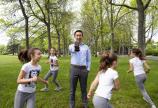Raising Draco
- Jody Paterson

Digital app helps families increase physical activity and healthy eating
At the intersection of health promotion, eHealth and psychology, a wee virtual dragon named Draco is in tryouts as a new tool in addressing childhood obesity in British Columbia.
University of Victoria researcher Sam Liu is piloting a smartphone app aimed at motivating families and their preteen children to increase their physical activity and eat nutritionally.
Draco is the star of that pilot. Liu, a professor in UVic’s School of Exercise Science, Physical and Health Education, describes Draco as “kind of like a Tamagotchi inspired exercise buddy,” referring to the wildly popular digital pets of 20 years ago.
Draco ups the Tamagotchi game by strategically encouraging young caregivers and their families into physical activity and healthy eating as a means to keep their new pet happy. Draco is one of the digital health tools developed to be piloted with the Generation Health program—a family-based community program to support making family changes to healthy behaviours across BC.
Liu’s Digital Health Lab research caught the eye of the Canadian Institutes of Health Research, which recently awarded UVic researchers nearly $500,000 to evaluate the Generation Health program and continue exploring how to leverage digital technology to promote health and well-being.
“How do we merge digital technology with in-person intervention to manage childhood obesity? That’s the question we want to answer,” says Liu. Some 30 per cent of Canadian children and youth in the age range targeted by the project are overweight or obese.
Participants using the Draco app are encouraged to take Draco for walks and give him nutritional foods, all of which keep Draco healthy. The broader goal is to help Draco find his way home, and along the way, increase the physical activity and eating habits of the dragon’s young owners. All participants are given a wearable device that collects data on their activity.
“Based on our user feedback, I was encouraged to see how many kids do engage with Draco. They are excited to do exercises, such as jumping jacks, with Draco,” says Liu.
Any intervention aimed at changing health behaviours must be fun and have buy-in from those being targeted, says Liu. “Sometimes with technology, when you build it, they don’t come.” An initiative has to resonate with people and be adaptable to their lifestyles, says Liu. Efforts have to be tailored right down to the individual user to motivate them to stick with something.
Liu drew on his postdoctoral work in data science and behaviour science in tailoring the digital health programs that he has developed. He had confirmed in earlier research that individuals’ social media data may be used as another data source to understand exercise behaviour—an insight that may be used to translate into a more customizable exercise app to help users feel even more motivated.
Liu’s previous research into healthy levels of smartphone use among children has informed his team’s latest project. That research identified healthy smartphone use patterns and confirmed the importance of parent messaging as vital in influencing their children’s behaviours.
Other funders of Liu’s work include BC’s Michael Smith Foundation for Health Research, the Childhood Obesity Foundation, Mitacs and the federal Social Sciences and Humanities Research Council.
EdgeWise
Obesity rates among Canadian children and youth have been on the rise for 40 years. Obesity in childhood is a predictor of obesity in adulthood, and a risk for physical health problems ranging from heart disease and Type II diabetes to sleep apnea, asthma, and bone and joint problems.
The Generation Health project is delivered in partnership with the Childhood Obesity Foundation, University of Victoria and BC provincial government in Victoria, Burnaby, Kelowna, Campbell River, Penticton, Chilliwack, Prince George, Coquitlam and Surrey. Liu is collaborating with UVic researchers PJ Naylor and Ryan Rhodes.
Changing children’s behaviour simply isn’t possible without their parents’ buy-in, says Liu. Both Draco and Generation Health strive to get the whole family motivated to eat well, be active and participate in the learning.
Liu asks his students to approach their work “with the mentality of a startup—agile, flexible and fast.” That means embracing failure as “the way we learn.”

